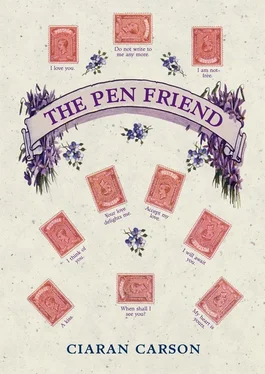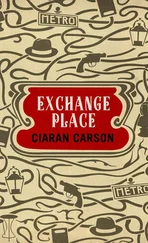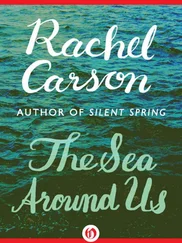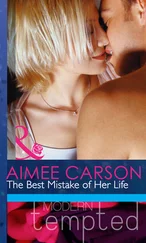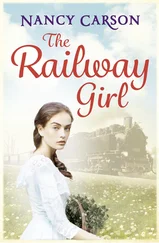I wondered if you had chosen both at the same time, premeditatedly, having already decided that your one-sided correspondence with me would be a long one, that each card would be a significant link in a chain, that the whole sequence was pre-planned and orchestrated, or if the second New York postcard had only occurred to you at some later stage, or if, indeed, it had been chosen on impulse that very day, the day before the day before yesterday, when you sat down to write my name and address, and the message, In dreams begin responsibilities .
No, hardly an impulse, I then thought, for the card bore an Irish stamp, and it seemed unlikely that you would have taken the whole booklet with you from London, but then maybe again you did, intending perhaps to select one of the images contained in it, not necessarily this one, for a purpose not entirely decided when you embarked for Ireland. For all I knew, you had a whole stack of cards to choose from. Whatever the case, the photograph is a beautiful and mysterious one, the interior of the station like a vast antechamber to another realm. Shafts of light striated by the glazing bars of the great half-moon windows stream down onto the concourse, where little knots of people have gathered accidentally or purposefully caught between arrival and departure, and one figure stands bathed in a pool of light as if waiting to be beamed up into another dimension. And I know that you would have intended this image as a reference to a dream I once had when I was going with you.
I told you about it the next morning. I was about to board a train bound for New York from Great Victoria Street station in Belfast — a journey entirely feasible in dreams — when you came running up to me and I said, Nina, what a lovely surprise, I thought you were in London. I was, you said, but I was speaking to your father on the phone, and he told me that you had just left for New York, so I thought I’d join you, we’d a lovely time when we were there before. So we boarded the train and went straight to the dining car, where we had a lovely candlelit dinner, caviar and oysters and lobster and champagne, and then we met a nice American couple, we played whist with them for a while before retiring to berth in the sleeping car for the night. We climbed into bed and let ourselves be rocked a while by the rhythm of the train, imagining its plume of smoke trailed like a line of foam as it sped across the dark Atlantic, and then I realised I was dreaming, and said, Nina, this is a dream. And you said, Yes, I know, but let’s stay in it for a while, it’s such a nice dream, and then I woke to find you lying beside me in my bed in Ophir Gardens. This is just as good as the dream, you said, and I said, Yes, but we’ll have to be very quiet, my father’s sleeping next door. Then the door opened, my father walked in, and I woke.
What a convoluted dream, you said, and how very Catholic. Well, it’s got a lot of perspectives in it, I said, maybe that’s what Catholic means, it reminds me of a Gerard Dillon painting, it’s called Self Contained Flat , he painted it in London in the early Fifties, I think he got the idea from one of those medieval paintings in the National Gallery, you know, where they show the same saint doing different things in the same panel, as if the different bits of a narrative all happen in the same space, in the same time, a kind of God’s-eye view. Well, Dillon shows his little bedsit in London, crammed with different perspectives, there’s a bit of Cubism in it too, here’s Dillon walking in the door, and here’s the same door opening on to a little garden where Dillon’s digging potatoes, here’s the poky kitchen with the gas stove and a little table with a blue milk jug, and a daffodil in a water-glass, and so forth, and the cat perched on the windowsill above the door, and Dillon in the foreground at a table with a blow-torch and a bottle of meths and pair of pliers and a screwdriver, he liked to show himself as a worker artist, though he’s wearing a very raffish blue check shirt and a nice waistcoat, and there’s a naked figure lying prone on the bed in the top right corner, you know the Gauguin painting, Spirit of the Dead Watching ? it’s a reference to that, the woman lying on the bed with her head turned to one side, looking at us with her eyes closed, as if Dillon’s whole painting was maybe dreamed by her. It’s a very happy painting, I said, someone who’s pleased with himself and his little self-contained world, but it’s got that touch of melancholy in it.
There was more than a touch of melancholy in some of my other dreams about you, Nina. Sometimes I would find myself wandering a Belfast with bits of London embedded in it, such as Leadenhall and Threadneedle Street, an area of monumental banks and churches. You would step out from behind a column of a gloomy portico, looking as beautiful as ever, if a little older than when we were going together, you’re wearing a navy wool suit with a knee-length skirt, and an electric blue Art Deco scarf tied round your throat, and little sapphire stud earrings, and dark blue stockings and black ankle boots with a Cuban heel, and I would say, Nina, you’ve come back, I knew you would come back, and a panic-stricken look would come across your face, and you would say, No, no, Angel, I don’t know what I’m doing here, in these clothes, you must be dreaming, you must have summoned me to appear in your dream, you must stop it, Angel, I can’t be here.
And then I knew I was dreaming, but I wanted the dream to continue, so overpowered was I by your beauty, so overwhelmed by your palpable presence, for I reached out and touched your cheek, I could feel the warmth of your flesh, and I said, No, Nina, please, stay with me in the dream for a while. What can it matter to you, if it’s only a dream? We can be happy for while in the dream, it can be just as it was in the old days, and then you can go back to your own life, I won’t bother you again, just give me this one night, I said. And tears would well in your eyes, and you would shake your head dumbly, and I would go on, Please, Nina, just one night, I’ll take you to this lovely restaurant I’ve just found, for just then I remembered the restaurant from another dream of Belfast-London, where there were better restaurants than in the real Belfast, and I could picture it in my mind’s eye, it was in one of those alleyways off Corporation Square, Bologna, it was called. You’d really like it, Nina, it’s a real find, just very good simple Italian food, they do this tricolore salad with mozzarella and tomatoes and basil and olive oil, just that, with a grind of black pepper and a pinch of salt, and the tomatoes burst with flavour against the milky mozzarella, little pillows of mozzarella, perfumed with basil, and then the grassy peppery tang of the oil, and then there’s the lamb chops, they’ve been marinaded in olive oil and lemon juice and rosemary, all they do is char them on both sides on an iron griddle, they’re oozing with pink juices inside, or maybe you could have the roast pork, shoulder of pork that they do on a spit over a fire of juniper branches, and then their divine zabaglione, some espresso and a grappa, I said, the grappa’s really special, and then we could go to the 77 Club, they’ve got this brilliant singer, she does Billie Holiday numbers, well, yes, I know what you’re going to say, no one can do Billie Holiday like Billie Holiday, but this woman, she’s something special, she does it with respect, no false histrionics, and she gives the songs her own edge, she puts her own experience into them, as well as what she understands of Billie’s experience, it’ll be just like you told me, Nina, how you imagined it, I can see her with that white gardenia in her hair, you said, isn’t it strange how the song makes you see the singer, she’s standing in a spotlight in a bar in New York, you said, and it’s dark but there’s those little tea-lights in faceted glass holders on the tables and you can see hands holding cigarettes and cocktail glasses, a face or two maybe, the smoke curling up and drifting into the spotlight, and we’ll be there, Nina, it’ll be like that, Nina, I said.
Читать дальше
